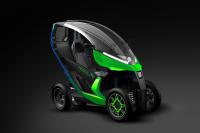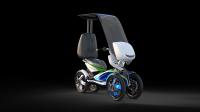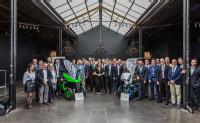WMG News
RESOLVE prototypes shape future of electric urban commuting
 The future of daily urban commuting could be small, lightweight Electric L-category Vehicles (ELVs). A cost effective, energy efficient and comfortable alternative to traditional cars in cities, is at the heart of the €6.92m RESOLVE project, which included WMG at the University of Warwick.
The future of daily urban commuting could be small, lightweight Electric L-category Vehicles (ELVs). A cost effective, energy efficient and comfortable alternative to traditional cars in cities, is at the heart of the €6.92m RESOLVE project, which included WMG at the University of Warwick.
The European project – named ‘Range of Electric Solutions for L-category Vehicles’ – designed and developed two stylish tilting four-wheeler prototype ELVs with leading European manufacturers Piaggio and KTM. These demonstrators were unveiled, and presented to representatives from the European Commission, at an event in Brussels in April 2018.
WMG was one of fourteen partners in the project, which included leading names from industry and research such as Piaggio, KTM, Bosch, Ricardo, the Austrian Institute of Technology, and the University of Florence.
Together the partners delivered two exciting and attractive ELVs that share common powertrain subsystems and innovations such as a new battery subsystem, electrical machine and smart range management software developed by WMG.
Researchers from WMG, at the University of Warwick, led on the design and verification of the Energy management and Active Safety algorithms for both demonstrators.
Headed by WMG’s Professor David Greenwood and Dr James Marco their responsibility was to enhance the overall performance, energy efficiency and safety of L-segment vehicles through a rigorous programme of research, to optimise the design and integration of the active stability control software with smart range management and regenerative braking algorithms.
The research team defined and implemented innovative high-level vehicle control algorithms to achieve integrated electronic control of the following functions:
 Regenerative Braking – to maximize the energy efficiency of the powertrain through enhanced energy recuperation under braking within an urban environment while maintaining high levels of vehicle refinement and driveability.
Regenerative Braking – to maximize the energy efficiency of the powertrain through enhanced energy recuperation under braking within an urban environment while maintaining high levels of vehicle refinement and driveability.
Smart Range Management – to improve the energy management and vehicle range estimation, with the range estimation integrated with the user via a new phone app to take account of the urban environment, driving style and journey distance.
Stability Control – to improve the performance and active safety of the vehicles when operating within urban environment.
 Professor Greenwood, a leading expert in energy storage and low carbon vehicles and lead for the Advanced Propulsion Systems team at WMG, commented:
Professor Greenwood, a leading expert in energy storage and low carbon vehicles and lead for the Advanced Propulsion Systems team at WMG, commented:
"L segment vehicles are an under-exploited opportunity in Europe to address energy consumption and pollution in cites. Their light weight and modest range requirements make them ideal for electrification. In this project we were able to investigate the control and stability limits of a fun-to-ride tilting vehicle platform and gain learning which will equally apply to all-wheel-drive electric cars in the future."
Notes to editors:
RESOLVE was an EU Horizon 2020 project which ran from 2015 – 2018.
Led by Piaggio and involvig WMG at the University of Warwick, the other partners were Austrian Institute of Technology; Bosch; Czech Technical University; IDIADA Automotive; Kiska; KTM; Magneti Marelli; RE:Lab; Ricardo; University of Florence; University of Pisa; Wamtechnik.
More information on RESOLVE here.
RESOLVE prototypes shape future of electric urban commuting
The future of daily urban commuting could be small, lightweight Electric L-category Vehicles (ELVs) – a cost effective, energy efficient and comfortable alternative to traditional cars in cities, is at the heart of the €6.92m RESOLVE project, which included WMG at the University of Warwick.
The European project – named ‘Range of Electric Solutions for L-category Vehicles’ – designed and developed two stylish tilting four-wheeler prototype ELVs with leading European manufacturers Piaggio and KTM. These demonstrators were unveiled, and presented to representatives from the European Commission, at an event in Brussels in April 2018.
WMG was one of fourteen partners in the project, which included leading names from industry and research, Piaggio, KTM, Bosch, Ricardo, the Austrian Institute of Technology, and the University of Florence.
Together the partners delivered two exciting and attractive ELVs that share common powertrain subsystems and innovations such as a new battery subsystem, electrical machine and smart range management software developed by WMG.
Researchers from WMG, at the University of Warwick, led on the design and verification of the Energy management and Active Safety algorithms for both demonstrators.
Headed by WMG’s Professor David Greenwood and Dr James Marco their responsibility was to enhance the overall performance, energy efficiency and safety of L-segment vehicles through a rigorous programme of research, to optimise the design and integration of the active stability control software with smart range management and regenerative braking algorithms.
The research team defined and implemented innovative high-level vehicle control algorithms to achieve integrated electronic control of the following functions:
Regenerative Braking – to maximize the energy efficiency of the powertrain through enhanced energy recuperation under braking within an urban environment while maintaining high levels of vehicle refinement and driveability.
Smart Range Management – to improve the energy management and vehicle range estimation, with the range estimation integrated with the user via a new phone app to take account of the urban environment, driving style and journey distance.
Stability Control – to improve the performance and active safety of the vehicles when operating within urban environment.
Professor Greenwood, a leading expert in energy storage and low carbon vehicles and lead for the Advanced Propulsion Systems team at WMG, commented:
"L segment vehicles are an under-exploited opportunity in Europe to address energy consumption and pollution in cites. Their light weight and modest range requirements make them ideal for electrification. In this project we were able to investigate the control and stability limits of a fun-to-ride tilting vehicle platform and gain learning which will equally apply to all-wheel-drive electric cars in the future."
Notes to editors:
RESOLVE was an EU Horizon 2020 project which ran from 2015 – 2018.
Led by Piaggio and involvig WMG at the University of Warwick, the other partners were Austrian Institute of Technology; Bosch; Czech Technical University; IDIADA Automotive; Kiska; KTM; Magneti Marelli; RE:Lab; Ricardo; University of Florence; University of Pisa; Wamtechnik.
More information on RESOLVE here.
